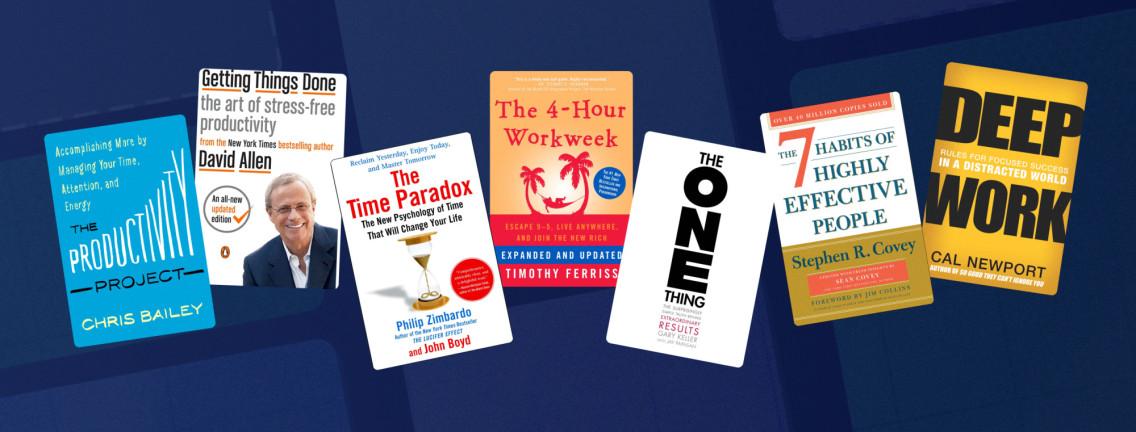If you're looking to improve your time management skills and increase your productivity, you're in luck! There are numerous excellent books on the subject, each providing a wealth of insights and ideas for managing your time and getting more done. Here are our top picks that each provides a unique approach to time management while sharing a few fundamental themes.
All of these books highlight the significance of defining objectives and priorities, and many of them provide tactics for overcoming procrastination and distractions. They also uncover the fact that really good time management is about more than simply being efficient; it is also about finding meaning and happiness in your work.
So, whether you're looking to streamline your workflow, increase your focus, or simply find a better balance in your life, these 7 books on time management have something to offer.
1. "The Productivity Project: Accomplishing More by Managing Your Time, Attention, and Energy" by Chris Bailey
"The Productivity Project" is a 2016 self-help book. Chris Bailey, a productivity guru, and entrepreneur wrote the book after conducting a year-long productivity experiment in which he tried several productivity ideas and techniques. The book is based on the observations and lessons he gained through this experience.
The book covers a wide range of productivity themes, such as how to define objectives and priorities, manage your time effectively, and combat procrastination. It also provides a variety of practical productivity suggestions and methods, such as how to use technology successfully and how to maximize your physical and mental energy. "The Productivity Project" is an excellent resource if you want to boost your productivity and do more.
2. "Getting Things Done: The Art of Stress-Free Productivity" by David Allen
"Getting Things Done" is a must-read for anyone trying to enhance their productivity and organization. This productivity technique, created by David Allen and first described in his 2001 best-seller, has been translated into over 28 languages and has a devoted following. I’m sure you’ve heard people talk about GTD. If you didn’t know what the acronym was referring to, this is it.
The system is based on the premise that our brains aren't designed to keep track of and organize every task and commitment we have. Instead, it recommends storing these tasks and commitments in a "trusted system" outside of your head so you can concentrate on the tasks at hand. The book outlines a five-step process for managing tasks and commitments, as well as tools and techniques for putting the system in place, such as action lists, effective calendar, and to-do list use, email management, and task prioritization. With "Getting Things Done," you can say goodbye to stress and hello to productivity.
3. "The Time Paradox: The New Psychology of Time That Will Change Your Life" by Philip Zimbardo and John Boyd
The book "The Time Paradox" is a must-read for anyone who wants to improve their time management skills and overall well-being. This book, written by Philip Zimbardo and John Boyd and published in 2008, investigates how our attitudes and beliefs about time influence our behavior and happiness.
The concept of "time perspective" is introduced in the book, which refers to how we think about and value different dimensions of time (such as the past, present, and future). According to the authors, people who have a balanced time perspective, which considers all three dimensions of time, are more likely to be successful and satisfied with their lives. In addition to delving into the psychology of time, the book offers practical advice on time management, goal setting, and overcoming procrastination. "The Time Paradox" is a must-read if you want to improve your time management skills and increase your overall happiness.
4. "The Four Hour Work Week" by Timothy Ferriss
"The Four Hour Work Week" is a best-selling self-help book that was first published in 2007. Tim Ferriss, an entrepreneur, and author known for his unconventional approach to productivity wrote the book. The book advocates for a radical rethinking of traditional work practices and offers several strategies for accomplishing more in less time and effort.
The book is structured around the concept of "mini-retirement," which refers to taking multiple short breaks from work throughout one's career rather than waiting until retirement to enjoy leisure time. The book discusses topics such as task automation and delegation, optimizing your work environment and schedule, and utilizing online tools and resources to work more efficiently. It also includes a number of case studies and examples of people who have used the book's principles to significantly increase their productivity and success. Many readers have been inspired by "The Four Hour Work Week" to reconsider their own work habits and goals.
5. "The One Thing: The Surprising Simple Truth Behind Extraordinary Results" by Gary Keller and Jay Papasan
"The One Thing" is a best-selling self-help book that was published in 2013. Gary Keller and Jay Papasan, both successful entrepreneurs and business authors, wrote the book. The book promotes a "less is more" approach to productivity, arguing that by focusing on a single goal or task at a time, people can accomplish more and be more successful.
The book is structured around the concept of the "domino effect," which refers to the idea that small, focused actions can have a large impact. It discusses topics such as goal setting and achievement, task prioritization, and staying motivated. It also includes a number of exercises and tools to assist readers in applying the book's principles to their own lives. "The One Thing" is a great resource if you want to increase your productivity and achieve your goals.
6. “The 7 Habits of Highly Effective People" by Stephen R. Covey
"The 7 Habits of Highly Effective People" is a self-help book that has become legendary since its initial publication in 1989. It's no surprise that this book has become a go-to resource for personal development, with over 40 translations and a devoted following. So, what exactly is the big deal?
The book outlines seven habits that successful people share and categorizes them as private victory (personal habits), public victory (interpersonal habits), and renewal (physical and spiritual habits). "The 7 Habits of Highly Effective People" covers a wide range of topics and includes exercises and tools to help readers apply its principles to their own lives, from setting priorities to improving communication and personal growth. This book is essential to read if you want to improve your productivity at work or simply improve your relationships and overall well-being.
7. "Deep Work: Rules for Focused Success in a Distracted World" by Cal Newport
The self-help book "Deep Work" was released in 2016. Cal Newport, a computer scientist, and productivity expert, wrote the book. The book promotes the value of "deep work," which Newport defines as the ability to focus on a cognitively demanding task without distraction.
The benefits of deep work are discussed in the book, including increased productivity and the ability to produce high-quality work. It also includes a number of strategies and techniques for cultivating the ability to do deep work, such as how to create an appropriate work environment and how to effectively manage your time. The book also discusses the modern-day challenges of cultivating deep work, such as the prevalence of digital distractions. "Deep Work" is an excellent resource for improving your focus and productivity.
Improve Your Time Management
These seven time management books provide a wealth of insights and strategies for increasing productivity and achieving your goals. These books cover a wide range of topics that can help you manage your time and get more done, from setting priorities and overcoming procrastination to optimizing your work environment and cultivating deep work. Whether you want to improve your workflow, increase your focus, or simply find a better balance in your life, these books will provide you with valuable insights and strategies to help you succeed.
Consider incorporating the best parts of each book into your daily routine. Think about how you can mix deep work with a singular focus on the most important task as defined by GTD and how you can delegate any tasks that don’t truly need to be completed by you.
Updated January 9, 2023 in Tips & Tricks






